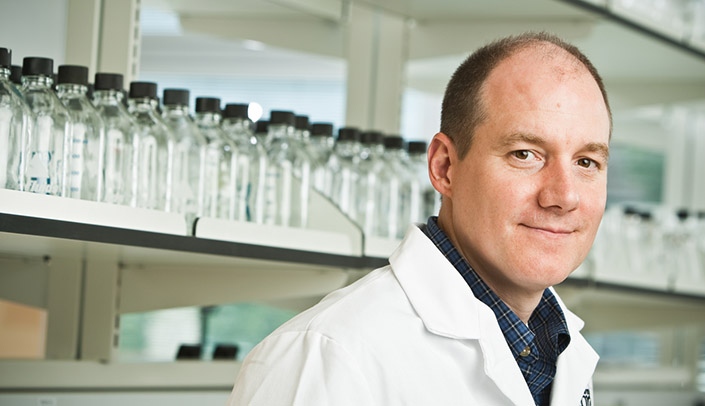UNMC will join with Iowa State University, the University of Nebraska-Lincoln and the University of Iowa to lead a national institute addressing a global public health concern: antimicrobial resistance.
The Association of Public and Land-grant Universities and the Association of American Veterinary Medical Colleges announced the new Institute for Antimicrobial Resistance Research and Education last week.
Each year in the U.S., at least 2 million people become infected with bacteria resistant to antibiotics, and 23,000 people die as a direct result of these infections. Many more die from other conditions complicated by an antibiotic-resistant infection, according to the Centers for Disease Control and Prevention. These drug-resistant “superbugs” also harm the ecosystem and cost multibillions annually in medical costs and economic losses.
“The emergence of antibiotic resistance is a complex process that is exacerbated by the unnecessary use of antibiotics to treat non-bacterial infections, like the common cold, as well as their non-therapeutic use in the agricultural industry to increase profit margins,” said Ken Bayles, Ph.D., associate vice chancellor for basic science research and professor of pathology and microbiology at UNMC and a member of the institute’s leadership team. “Combined with a dwindling pipeline of new antibiotics, resistance to antibiotics is a major threat to human health. This consortium will address these issues head-on through highly collaborative interactions between researchers with interests in both human and animal health.”
Iowa State will be home to the new institute, which will aim at improving health for people, animals and the environment. The institute stems from recommendations by a joint AAVMC/APLU task force, which authored a 2015 report outlining an array of research and education initiatives to address antimicrobial resistance. The institute will help coordinate and implement those recommendations at universities and veterinary medical colleges across the country.
These universities began to address some of these same problems three years ago through the Antimicrobial Resistance Consortium, a research initiative that has involved UNMC, ISU, the USDA Agricultural Research Service, the University of Nebraska-Lincoln, the University of Iowa, Mayo Clinic and a team of more than 100 researchers, educators, clinicians and extension personnel.
“Antimicrobial resistance touches each of us in our daily lives. This new institute provides a great resource for the entire country as we work to build strong, collaborative research and educational programs to mitigate this risk,” said Paul Plummer, D.V.M., associate professor of veterinary diagnostic and production animal medicine at Iowa State. Plummer directed the AMR Consortium and will serve as executive director of the Institute for Antimicrobial Resistance Research and Education.
The partners’ proposal for the institute was selected from among nine submitted by major universities from throughout the nation.
